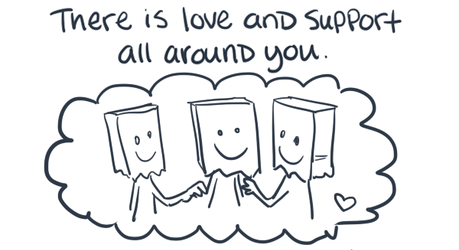- Rosie Liddell
In my interactions with young people as a counsellor, I have found that a large part of what helps someone to cope with the difficulties they're experiencing is setting up for them a support network. A support network is a map of anybody that you can talk to and get support from. Not only does it help signpost young people to what help and support is available to them, it also helps to combat feelings of isolation and helplessness. It helps to send a message to that person that whatever they're going through does not have to be something that they struggle with alone; they deserve and can have support.
What constitutes a support network can be a mixture of personal and professional services - family, friends, and counsellors being common sources of support. Importantly, what constitutes part of that network can be peer-support - a method of support whose value should not be underestimated.
I currently help to run a listening service for students that operates as a form of peer-support due to the organisation's volunteers comprising of students. There is something immensely valuable in having and promoting services, such as this, that help to give students the opportunity to speak to someone who is close to you in age about what you are going through. While all of our experiences are going to be in some sense individual, as students we can identify with each on a range of issues relating to life at university. Issues such as academic stress, relationships, university procedures, and house troubles are issues that can affect all of us. As a result, these issues bring us closer together and provide the means for support.
Therefore, while external help from counselling services and other professional services may be helpful, there is a sense in which talking through your experiences with someone who can identify with at least some of what you're going through reinforces the idea that you don't have to struggle all on your own.
If you look at the message boards on the Childline website, you can see a sense of collective support: if a young person has a problem, other young people can provide insight and guidance on how to cope due to the fact that a lot of them have gone through similar things themselves or know someone who has. That sort of support can be invaluable in helping a young person recover.
Peer support is often invaluable to the supporter as well. Students who have volunteered for Nightline or attended a Student Minds peer support group have reported that being in a position to help other students with mental health difficulties has made them feel valued and contributed hugely to their wellbeing. It isn't even necessary that students have the 'solutions' or 'answers' to the difficulties someone is facing - students can play a key role in somebody's recovery just by being there to say that they have been through the same difficulties before and understand what those difficulties are like.
Peer Support Options at University
There are lots of peer support options at university. One option is a listening service for students such as Nightline. There are over 60 Nightlines who provide peer support in the UK. For more information you can look at the Nightline association's website: http://www.nightline.ac.uk. Meanwhile, the helpline GetConnected is a service that connects young people to a specific helpline for support on specific issues: www.getconnected.org.uk.
Student Minds runs a network of peer support groups for eating disorders and depression. These groups are facilitated by trained student volunteers, who are there to listen to the experiences of students attending and ensure that the conversation is pro-recovery. They are an opportunity for students to come to a place where they can talk openly in a safe and non-judgemental environment, and share experiences and coping strategies with other students. More information can be found here: www.studentminds.org.uk/about-our-support-programmes
Finally, for young people up to the age of 19, the Childline Website has a lot of useful information on topics affecting young people, including help in getting support and the message boards provide support and insight from other young people.
For many students, peer support is a vital component of their recovery. For yet more students, peer support is an important way that they can give back to the student community and make use of their experience and position as fellow student. Let's not underestimate the value of peer support - both for the supported, and the supporters.


No comments:
Post a Comment